great grandparents
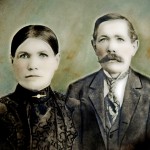 My great grandparents, Carl and Henriette (Hensel) Schumacher immigrated to the United States from Germany, in 1884 and 1882 respectively. It was an amazing time for them. The United States was a whole new world, and for those who came, the land of opportunity. By 1886, they were married and ready to start a family. My grandmother, Anna Schumacher was born in 1887, followed by siblings Albert, Mary (who died before she was 3), Mina, Fred, Bertha, and Elsa, who was born in 1902.
My great grandparents, Carl and Henriette (Hensel) Schumacher immigrated to the United States from Germany, in 1884 and 1882 respectively. It was an amazing time for them. The United States was a whole new world, and for those who came, the land of opportunity. By 1886, they were married and ready to start a family. My grandmother, Anna Schumacher was born in 1887, followed by siblings Albert, Mary (who died before she was 3), Mina, Fred, Bertha, and Elsa, who was born in 1902.
By 1914, World War I broke out, following the assassination of Franz Ferdinand. The government of the United States was understandably nervous about the German immigrants now living in in America. It didn’t matter that many of these people had been living in the united States for a long time, and some had become citizens, married, and had families. The government was still nervous, and I can understand how that could be, because we have the same problem these days with the Muslim nations. Still, when I think about the fact that these were my sweet, kind, and loving, totally Lutheran great grandparents, I find it hard to believe that anyone could be nervous about them. Apparently, I was right, because to my knowledge, they were never detained in any of the internment camps, nor were they even threatened with it.
Nevertheless, there were German nationals, and even naturalized citizens who faced possible detention during 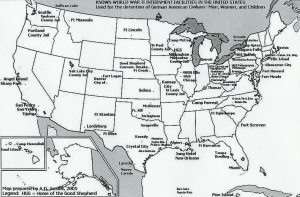 World War I and World War II. By World War II, President Franklin Delano Roosevelt declared Presidential Proclamation 2526, the legal basis for internment under the authority of the Alien and Sedition Acts. With the United States’ entry into World War I, the German nationals were automatically classified as “enemy aliens.” Two of the four main World War I-era internment camps were located in Hot Springs, North Carolina and Fort Oglethorpe, Georgia. Attorney General A. Mitchell Palmer wrote that “All aliens interned by the government are regarded as enemies, and their property is treated accordingly.”
World War I and World War II. By World War II, President Franklin Delano Roosevelt declared Presidential Proclamation 2526, the legal basis for internment under the authority of the Alien and Sedition Acts. With the United States’ entry into World War I, the German nationals were automatically classified as “enemy aliens.” Two of the four main World War I-era internment camps were located in Hot Springs, North Carolina and Fort Oglethorpe, Georgia. Attorney General A. Mitchell Palmer wrote that “All aliens interned by the government are regarded as enemies, and their property is treated accordingly.”
By the time of World War II, the United States had a large population of ethnic Germans. Among residents of the United States in 1940, more than 1.2 million persons had been born in Germany, 5 million had two native-German parents, and 6 million had one native-German parent. Many more had distant German ancestry. With that many people of German ancestry, it seems impossible that they could have detained all of them. Nevertheless, at least 11,000 ethnic Germans, overwhelmingly German nationals were detained during World War II in the United States. The government examined the cases of German nationals individually, and detained relatively few in internment camps run by the Department of Justice, as per its responsibilities under the Alien and Sedition Acts. To a much lesser extent, some ethnic German United States citizens were classified as suspect after due process and also detained. There were also a small proportion of Italian nationals 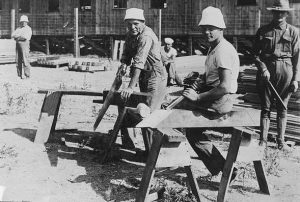 and Italian Americans who were interned in relation to their total population in the United States. The United States had allowed immigrants from both Germany and Italy to become naturalized citizens, which many had done by then. It was much less likely for those people to be detained, if they had already become citizens. In the early 21st century, Congress considered legislation to study treatment of European Americans during World War II, but it did not pass the House of Representatives. Activists and historians have identified certain injustices against these groups. I suppose that some injustices were done, but those were times of war and strong measures were needed.
and Italian Americans who were interned in relation to their total population in the United States. The United States had allowed immigrants from both Germany and Italy to become naturalized citizens, which many had done by then. It was much less likely for those people to be detained, if they had already become citizens. In the early 21st century, Congress considered legislation to study treatment of European Americans during World War II, but it did not pass the House of Representatives. Activists and historians have identified certain injustices against these groups. I suppose that some injustices were done, but those were times of war and strong measures were needed.
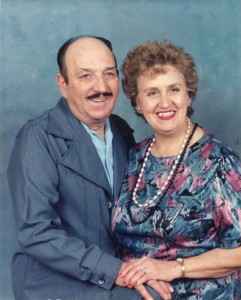 Because of my broken shoulder, and the fact that I am still taking an average on one pain pill a day, I can’t drive. My boss, Jim Stengel has been picking me up for work every day, and since I am back to work all day, and I can’t drive, I decided to take a walk during lunch. The cemetery is near my office, and so was a logical choice for a destination. As I walked, I took pictures of a large number of graves, because I am a member of the Find A Grave site that sets up memorials for people who have passed away, so their loved ones can add the information to family trees. That part of my walk was something that made me feel like I had accomplished something good, but it was something that happened a little later in the walk that I found to be so sweet that I had to share it.
Because of my broken shoulder, and the fact that I am still taking an average on one pain pill a day, I can’t drive. My boss, Jim Stengel has been picking me up for work every day, and since I am back to work all day, and I can’t drive, I decided to take a walk during lunch. The cemetery is near my office, and so was a logical choice for a destination. As I walked, I took pictures of a large number of graves, because I am a member of the Find A Grave site that sets up memorials for people who have passed away, so their loved ones can add the information to family trees. That part of my walk was something that made me feel like I had accomplished something good, but it was something that happened a little later in the walk that I found to be so sweet that I had to share it.
During my walk, I stopped by my parents’ graves. I took a picture there, just because I often do. Maybe it’s to keep them close in my memory. I can’t really say. Then I straightened some of the flowers we have on their graves, and when I looked down, I noticed a nickel on the base of the headstone. There was no doubt in my mind where that nickel came from, because my niece Jenny Spethman, and her husband Steve often bring their children by to visit the grave of their baby sister, Laila, which is close by my parents’ grave. They never fail to stop at their great grandparents’ grave too. They loved them so much.
 In the five years since their sister’s passing, Jenny and Steve’s children have come to the grave often, and since it is so close, they visit my parents’ graves too. During that time, I have seen so many gifts they have left for their great grandparents, whom they loved very much. They have left rocks, toy guns, cars, and now a nickel. There were many others too. They give the best of themselves. The things that mean the most to them, are the things that they want to share with their great grandparents. Our is a close family, and the great grandchildren were very close with their great grandparents. Loss is hard on everyone, but for the little kids, it is so much to accept. They often don’t exactly understand what happened…even when they know what death is, they still wonder when their loved one is coming home. Eventually they learn, especially when death becomes such a glaring reality, like the passing of their baby sister. Still, in their trusting heart, they know that their God has their loved ones, safe in His loving arms. To leave a gift on the headstone is another form of trust. They trust that God will tell their loved on about the gift they left, and about the love they feel for their loved one…forever.
In the five years since their sister’s passing, Jenny and Steve’s children have come to the grave often, and since it is so close, they visit my parents’ graves too. During that time, I have seen so many gifts they have left for their great grandparents, whom they loved very much. They have left rocks, toy guns, cars, and now a nickel. There were many others too. They give the best of themselves. The things that mean the most to them, are the things that they want to share with their great grandparents. Our is a close family, and the great grandchildren were very close with their great grandparents. Loss is hard on everyone, but for the little kids, it is so much to accept. They often don’t exactly understand what happened…even when they know what death is, they still wonder when their loved one is coming home. Eventually they learn, especially when death becomes such a glaring reality, like the passing of their baby sister. Still, in their trusting heart, they know that their God has their loved ones, safe in His loving arms. To leave a gift on the headstone is another form of trust. They trust that God will tell their loved on about the gift they left, and about the love they feel for their loved one…forever.
 Some would call that childlike innocence, believing in fairy tales, or even a child’s imagination, but I say that it is the faith of a child…unmarred by so many years of being told that God doesn’t do much in this day and age, that miracles are a thing of the past, or that we are on our own here. They are so close to God, that the world hasn’t had time to muddy the waters of their faith. They simply believe that their loving God cares about every little thing in their life, including the gift they wanted to give their great grandparents. Their faith is not spoiled by this world. They simply know that their God will tell their loved on that they love them…always and forever. That is the faith of a child, and it was so sweet for me to see. And all it took was a nickel left on a headstone.
Some would call that childlike innocence, believing in fairy tales, or even a child’s imagination, but I say that it is the faith of a child…unmarred by so many years of being told that God doesn’t do much in this day and age, that miracles are a thing of the past, or that we are on our own here. They are so close to God, that the world hasn’t had time to muddy the waters of their faith. They simply believe that their loving God cares about every little thing in their life, including the gift they wanted to give their great grandparents. Their faith is not spoiled by this world. They simply know that their God will tell their loved on that they love them…always and forever. That is the faith of a child, and it was so sweet for me to see. And all it took was a nickel left on a headstone.
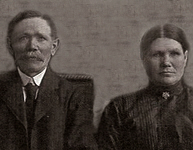 My great grandparents, Carl and Albertine Schumacher immigrated to the United States from Germany, before they even knew each other. When they arrived, they, like most immigrants, could not speak English very well. It made communication difficult in those early years. Eventually, they learned enough English to get by, but the family still spoke German in the home. German continued to be the home language for many years. In fact, it would take a teacher at the school where their two oldest children, Anna and Albert attended, who made fun of their language, to change their home life forever. When the children came home upset about the thoughtlessness of the teacher, my great grandmother, said, “That’s it!! From now on, this family will speak only English in this house!” She did it to protect her children from further ridicule, but looking back on that time now, I think it is a bit sad that the German language that had been a part of their heritage for generation and generations, was now lost forever. I know that my great grandparents probably always remembered the language, but for their children much of it was lost, and for their children, it was completely lost.
My great grandparents, Carl and Albertine Schumacher immigrated to the United States from Germany, before they even knew each other. When they arrived, they, like most immigrants, could not speak English very well. It made communication difficult in those early years. Eventually, they learned enough English to get by, but the family still spoke German in the home. German continued to be the home language for many years. In fact, it would take a teacher at the school where their two oldest children, Anna and Albert attended, who made fun of their language, to change their home life forever. When the children came home upset about the thoughtlessness of the teacher, my great grandmother, said, “That’s it!! From now on, this family will speak only English in this house!” She did it to protect her children from further ridicule, but looking back on that time now, I think it is a bit sad that the German language that had been a part of their heritage for generation and generations, was now lost forever. I know that my great grandparents probably always remembered the language, but for their children much of it was lost, and for their children, it was completely lost.
When I was in school, I fell in love with the German language, and took it in school for four years. It was so interesting to me to speak the German language, but the biggest problem was that I had no one to speak it with at home. I can see how speaking one language in the home and another at school could have become a problem for my grandmother and great uncle. It would be hard for them to learn English when German was spoken in the home. I know that the opposite made it very hard for me. The only time I got to speak German was the hour I had class each day. It would be especially confusing for younger children. Nevertheless, I think it could be done, and would have been beneficial for all of the children.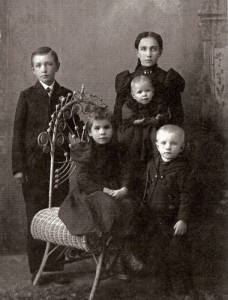
Over the years, I have been an advocate for English being our countries official language, and I still feel that way, but I also think it is great when people can speak more than one language. In my opinion, it is rude to speak another language in the company of people who cannot speak it back, because they invariably get the feeling that you are talking about them, and perhaps you are. Even if you aren’t, they will always believe you were. That is why I think it is important to consider those around you when choosing to speak a language that is not the common one to the area you are in. Of course, when you are not in a conversation with those around you, like in a grocery store, it’s a different thing. I think people should pass their heritage, culture, and language down to children and grandchildren, because it will never be something they regret giving them, but it is also important to embrace their new home when they immigrate, because that is where you will live, work, and socialize from then on.
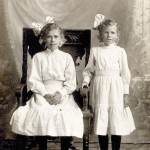 These days, with most towns having multiple schools, our school days are often taken for granted, and even viewed…by many students and boring, grueling, and basically something to get through and over with, so they can move on to real life. But, schooling in the old west, and even into the mid 1900’s wasn’t always such an easy thing to accomplish. As our nation grew, and people spread out across its vastness, schools were one thing in short supply. Many parents had to home school their children, which is becoming more of a luxury item these days, because with home schooling, comes the loss of one income, and many people can’t or don’t want to make it on one income.
These days, with most towns having multiple schools, our school days are often taken for granted, and even viewed…by many students and boring, grueling, and basically something to get through and over with, so they can move on to real life. But, schooling in the old west, and even into the mid 1900’s wasn’t always such an easy thing to accomplish. As our nation grew, and people spread out across its vastness, schools were one thing in short supply. Many parents had to home school their children, which is becoming more of a luxury item these days, because with home schooling, comes the loss of one income, and many people can’t or don’t want to make it on one income.
When my great grandparents, Carl and Henriette Schumacher moved their family from Minnesota to North Dakota, they were quite a way from the school, but they saw the importance of educating their children. The family spoke German at home, and when the older children started school, the teachers made fun of their lack of the knowledge of the English language. Henriette immediately set out to change that. German would no longer be spoken in the home. The whole family would make the switch to English. The distance to school was a big problem, but Carl made sure that his children were there…no matter what.
That worked well for the older children, but at that time in history, many children didn’t go to school after the 6th grade, and some quit sooner. So, when Bertha and Elsa, the youngest children were in school, a new problem presented itself. The school was nearer to them now, but often there were not enough students to warrant keeping it open, thus their education became hap-hazard. That is not to say that they did not get their education, because they did, and even went on to college. Theirs was just a little bit different than their older siblings.
Bertha tells of going to school in the small school, with very few students, but she also talks of the year they were home schooled but their oldest sister, my future grandmother, Anna. She talks of the time that they spent in a small house in Lisbon, with Mina staying with them so they could go to school. And of course, there were the times they went by horse and buggy into school. Those were hard times, and I have to wonder how the girls kept up with the other students, and were able to continue on to the high school in Lisbon. It’s not that I wondered about my grandmother’s ability to teach, but with little or no regulation, how did the school in Lisbon know anything about their prior education.
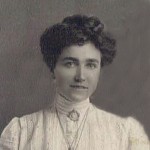
I suppose they had to take some kind of test or visit with the teacher for a time so they could determine where they were in their education, and therefore could be placed in one grade or another. I know that often in homeschooling situations today, the students are ahead of their age group, but I still wonder if that was the case then, because their materials were few and there was really no clear way to know if the teacher was keeping up with other classes for their pupils’ age groups. Those must have been hard and confusing times for Bertha and Elsa. Nevertheless, they both finished school, like their older siblings, and went on to college, but their education was definitely at The School of Hap-Hazard.
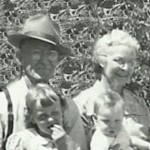 While visiting Bob’s great grandparents in Yakima, Washington in 1976, Grandma Knox showed me a family heirloom of a different type than most, but priceless nevertheless. It was a drawing of a tree, on which the trunk and branches were the names of family members. It was a true family tree. It must have been a copy of several or many that were made and given to family members in the Knox family, because I have since seen it on the Internet. And was able to save a copy on Ancestry.com.
While visiting Bob’s great grandparents in Yakima, Washington in 1976, Grandma Knox showed me a family heirloom of a different type than most, but priceless nevertheless. It was a drawing of a tree, on which the trunk and branches were the names of family members. It was a true family tree. It must have been a copy of several or many that were made and given to family members in the Knox family, because I have since seen it on the Internet. And was able to save a copy on Ancestry.com.
I think about the person who did all that original work. Her name was Hattie Goodman, and she is a relative on Bob’s side of our family. I would have to dig deeper to tell you exactly what the relationship is, but we are related, and on the copy that Grandma had, we know where our family section is. Of course, the tree does not show the names of my children or grandchildren, or even Bob and his parents, but his great grandparents are listed, so we know where we fit. It is an amazing piece of history, painstakingly written down by a woman I would love to have known, because I think she must have really been something!
Bob’s great grandparents are gone now, and I am quite sure his Uncle Frank still has the family tree drawing, as he is one of the last of the brothers born to Bob’s great grandparents, and the healthiest one for sure, making him the best choice to keep it. And he is also the one who would be the most interested in the family history, so he would treasure it.
It is quite a responsibility to be the family historian…and yet quite exciting too. You carry the 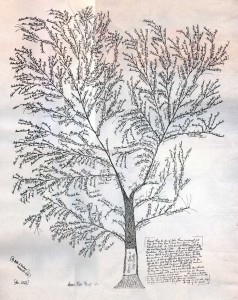 memories in your head, and you feel the need to get it down on paper, or online these days, so that it can be passed on to generations who would not have known these stories any other way. There are family historians in every family, and you know who you are. The memories live in the filing system in your mind, but they are not content to stay there. They continue to spill out in your writings as a memorial to times past. You feel the need to leave a legacy of the stories of the past, so that future generations will not forget where they came from.
memories in your head, and you feel the need to get it down on paper, or online these days, so that it can be passed on to generations who would not have known these stories any other way. There are family historians in every family, and you know who you are. The memories live in the filing system in your mind, but they are not content to stay there. They continue to spill out in your writings as a memorial to times past. You feel the need to leave a legacy of the stories of the past, so that future generations will not forget where they came from.
That is where I fit into the family, but I am not alone. Most families have several or sometimes even many people who are interested in those stories from the past. They can sit down and hear a story from the past, and immediately commit it to memory, and turn around and tell it to others to preserve the family history. This stuff just sticks in their memory so easily, and once it is in there, it stays. They are the family historians, and they have an important role in the family. Keeping the past alive for future generations.

